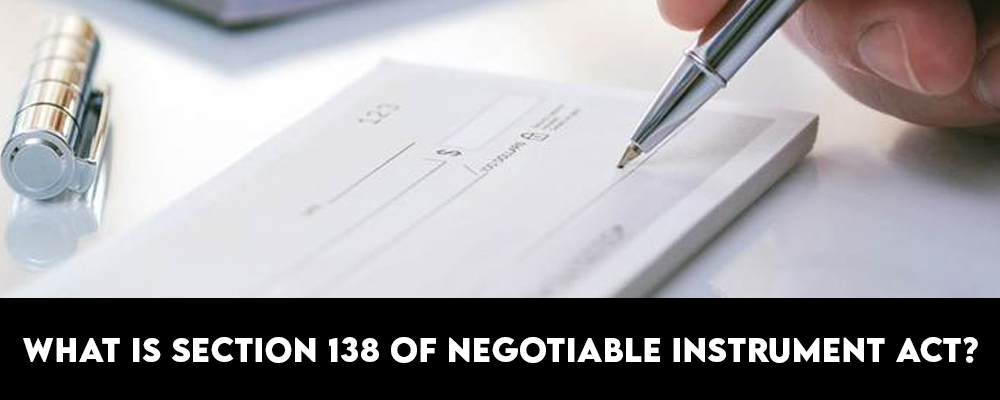The Negotiable Instrument Act, which was created to facilitate the expansion of banking and commercial operations, was enacted in the year 1881. Legalising the scheme of negotiable instruments was the main goal of this enactment. Negotiable Instruments are documents that can enable the transfer of certain monetary value in a legalised manner. The document creates an obligation to pay the agreed-upon amount at a specified future period or immediately upon request, as applicable.
Thus, the purpose of the Act can be interpreted to regulate certain financial transactions. The law governing negotiable instruments is legislation that focuses on the business world and was enacted to make trade and commerce simpler by creating provisions for the sanctification of instruments of credit that might be thought of as simply converted into money. A cheque is a form of negotiable instrument which has been defined under Section 6 of the Act. Section 138 of the Act deals with the dishonour of cheques. A circumstance known as “cheque dishonour” occurs when a bank declines to pay the sum of a cheque to the payee because of insufficient funds, among other reasons.
In the case of Modi Cements Ltd. v. Kuchil Kumar Nandi, the court had held that the objective, including the provision under Section 138 is to increase the effectiveness of banking operations and assure trustworthiness while using checks for payment. According to Section 138, dishonour of cheques has been regarded as an offence due to insufficient funds in the account that the account holder has with the banker or when the amount that is intended to be paid from the account according to a written agreement with the bank as specified in the act exceeds that amount.
In criminal law, Mens area is an essential component of a crime, but dishonour of cheque is a criminal offence there is no need of proving a mens area and it is not an essential thing. It is considered that construction of the strict liability under this section shall prove to be an effective measure to prevent usual carelessness or change of attitude of the drawers in the discharge of debts.
Necessary Elements to Constitute the Crime of Dishonour of Cheque:
- A cheque is drawn to pay off a debt or other liability that a person (drawer of the cheque) has to another person (holder of the cheque).
- A cheque is returned because there isn’t enough money in the account, or the amount is more than what the bank agreed to pay.
- The cheque needs to be deposited in the bank within a period of three months from the date on which it is drawn or within the validity period, whichever is earlier.
- Along with the official notification from the bank about the failure to pay the cheque, the drawer is sent a formal notice in writing within 30 days.
- The payee or the holder of the cheque is not paid the requisite amount within a period of fifteen days from the day notice is sent.
Need A Legal Advice
The internet is not a lawyer and neither are you. Talk to a real lawyer about your legal issue

Until 1989, dishonour of cheques created only civil liability in India. By means of an amendment of Section 138 of the Act, the failure to make the payment of the mentioned amount through a drawn cheque was converted to a criminal offence. According to Section 138 of the NI Act, a civil penalty of twice the value of the dishonoured check may be imposed.
However, if the payee brings a claim under Order 37 of the Code of Civil Procedure, and if the court rules in favour of the payee, the drawer must pay the sum which is specified in the order. In accordance with Section 138 of the Indian Penal Code (IPC), 1860, the offender may be sentenced to two years in prison, a fine, or both. The drawer of the cheque can also be charged under Sections 417 and 420 of the IPC. The Act does not specifically mention the proper jurisdiction for filing a criminal complaint under Section 138.
However, it can be perceived that the act is a criminal offence, it shall be filed in a criminal court and shall be guided by the provisions under CrPC. Recently, the Supreme Court held in the case of P. Rasiya v. Abdul Nazer and that the complainant in such cases is not obligated to describe the nature of the transaction or the source of funds in the complaint because it is the responsibility of the accused to establish that the cheque was not issued to pay off a debt or other obligation.
As dishonour of cheques imposes serious criminal punishment, when the bearer of the cheque informs the drawer that the bank has dishonoured the cheque, the drawer should immediately get in touch with your bank to find out whether the cheque has indeed bounced or not. If the cheque has genuinely bounced, the bank will let the drawer know about it and explain the reason why it was dishonoured.





 Talk to a Lawyer
Talk to a Lawyer